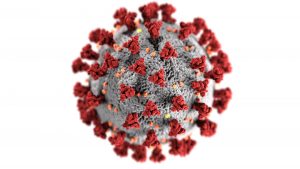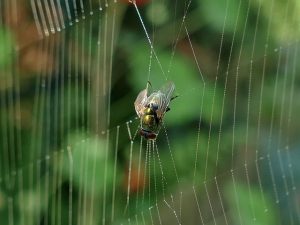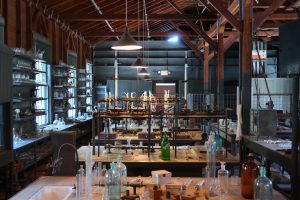We now have two monoclonal antibodies approved as therapy against COVID19 – which is the latest and greatest therapy and will be a great help to stem the tide – until such time as we have a vaccine – which is coming soon.
How Monoclonal Antibodies Work
Monoclonal antibodies are like a spider’s web – catching a bug and rendering the bug useless. In this case, the antibody is made in a lab, and it is made against a very specific part of the COVID19 virus particle. This antibody attaches to the virus and, like the spider, renders the virus useless.
In this case the antibody was made in a lab where they looked at a number of antibodies that were made against the SARS-Cov2 virus. Since many antibodies are made against the virus, the search was on for the antibody that would render the virus harmless.

You can imagine this microscopic virus, as pictured above, uses those spikes to gain entrance to the human cell and then reproduce itself. When the antibody attaches to those spikes, the virus cannot enter the human cell. Then more antibodies coat the virus until it is tangled in a “a web” of antibodies and rendered useless. The term we use is the virus is neutralized.
Since there are many types of antibodies that can be made against all of the different protein types on the virus, some are not as effective as others.
To develop these antibodies scientists evaluated thousands of antibodies against the virus that causes COVID19 (SARS-Cov2). For the case of Regeneron Pharmaceuticals, they found two that worked and they make an antibody cocktail, their names are casirivimab and imdevimab and they are administered together. Yes- those names are complex. Lilly Pharmaceuticals has another antibody, bamlanivimab (and in the podcast I tell you how to pronounce that) which was approved on November 2.
How Your Body Makes Antibodies
If you get COVID19 you will make antibodies against the virus, but they may not be that effective. But here is how your body does it.

Your body encounters a protein that it is unfamiliar with, and perceives as a threat. Be this in the skin, mucous membranes in your nose, mouth, or eyes, or in your blood. A white blood cell encounters this foreign protein (like the spike protein on the virus) and this starts a process where that white cell will divide to make more white cells and some of those will become plasma cells. The plasma cells are simply factories that make antibodies (think of them as the spider that makes the web). The other cells are memory cells, they remember the foreign body and if they encounter it again then it will rapidly make more plasma cells to make antibodies.
In our metaphor – the white blood cell is the spider, the antibody is the spider’s web. The spider remembers when it encounters its prey and will spin a web around the prey to disarm it, and later eat it. The white blood cell has a memory for its “prey” and will spin a web of antibodies which will disarm the virus and then the white cell will consume the complex or – like the spider, eat it.
Antibodies made by the laboratory
But besides the body making antibodies – we can make them in the lab. These manufactured antibodies originated from people who had the COVID19 infection and recovered.

We can take antibodies made by people who have recovered from COVID19 and clone them.
Since the body takes some time to make antibodies, having a ready supply of them pre-made saves. The “novel” coronavirus (SARS-COV2) has never been encountered by human bodies before November of 2019. So we don’t have memory.
By isolating the neutralizing antibody from people – then using manufacturing process to “clone” them, we have a ready supply.
These antibodies, from two companies, have been approved for people who are not quite sick enough to be in the hospital, and at high risk if they get COVID19. People like President Trump, who was over 65 and has over 50 lbs of weight to lose. In addition, former Governor Chris Christie and Housing Secretary Ben Carson (also over 65 with risk factors of hypertension). All of them credit these monoclonal antibodies with saving their lives.
Why not in the hospital? Because by then the virus course has gone too long and they won’t help. Antibodies are best in the early process, which is why we like immunization, to train the body to keep away from foreign proteins.
The podcast will tell you a bit more- as well as a primer on how to pronounce the one! Give a listen and enjoy.
Labs have developed other monoclonal antibodies that we use in some disease states:
One monoclonal antibody we use against some forms of cancer.
Another is used to treat lupus, another for rheumatoid arthritis.
Some monoclonal antibodies are used for people who have a transplanted organ (heart, kidney, lung, liver, pancreas, small bowel) and are rejecting it.
All these antibodies are made in a lab, and they are expensive. For the COVID19 monoclonal antibodies have been pre-purchased from Operation Warp Speed.
Still, they are our second best treatment – our best is the vaccine – more about that one later.
If you are at risk of serious illness from COVID19 – older than 65, or obese, or hypertension, then this may be the treatment for you.
